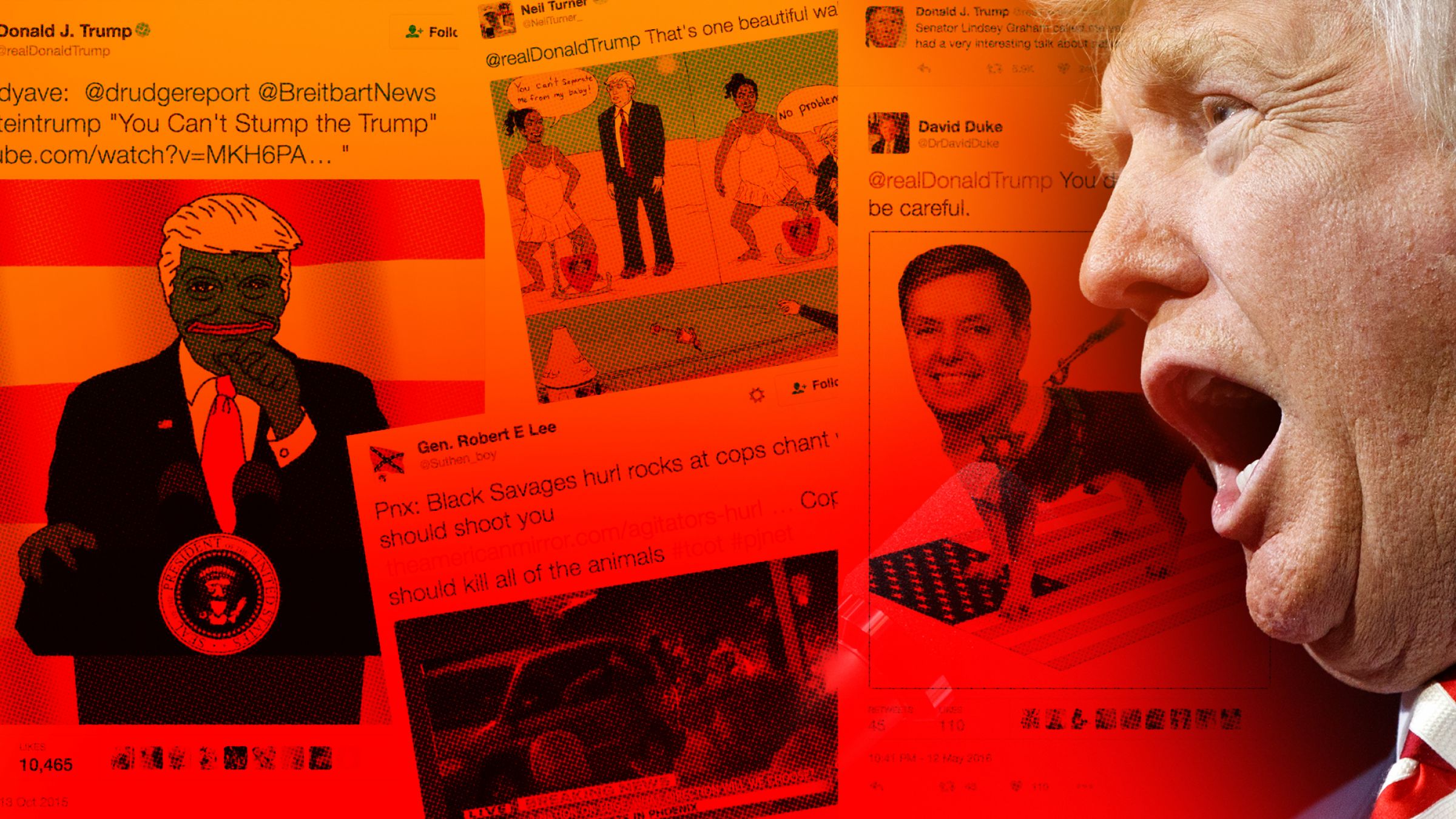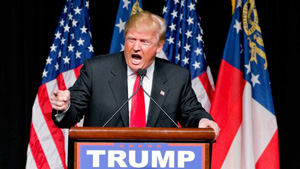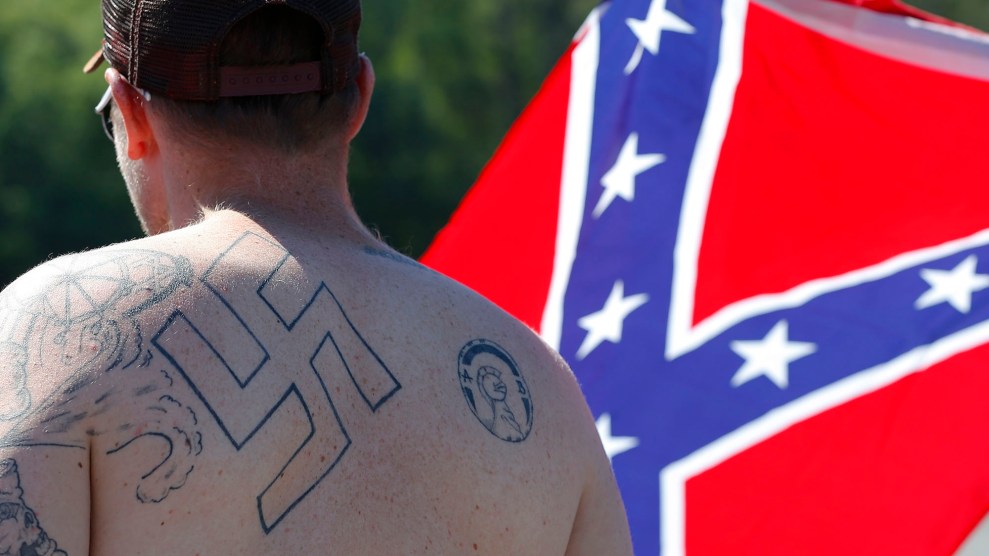The first warning sign that something new was brewing came in June 2015, as Donald Trump joined the crowded field vying for the Republican presidential nomination. In the extravagant lobby of Trump Tower in New York City, he announced he would build a wall to keep out Mexican criminals and “rapists.”
“I urge all readers of this site to do whatever they can to make Donald Trump President,” wrote Andrew Anglin, publisher of the neo-Nazi site Daily Stormer, 12 days later. Anglin, a 32-year-old skinhead who wears an Aryan “Black Sun” tattoo on his chest and riffs about the inferior “biological nature” of black people, hailed Trump as “the only candidate who is even talking about anything at all that matters.”
This neo-Nazi seal of approval initially seemed like an aberration. But two months later, when Trump released his immigration policy, far-right extremists saw a clear signal that Trump understood their core anger and fear about America being taken over by minorities and foreigners. Trump’s plan to deport masses of undocumented immigrants and end birthright citizenship was radical and thrilling—”a revolution,” in the words of influential white nationalist author Kevin MacDonald, “to restore a White America.”
Trump’s move was a “game changer,” said MacDonald, a 70-year-old silver-haired former academic who edits the Occidental Observer, which the Anti-Defamation League calls “online anti-Semitism’s new voice.” Trump, he wrote, “is saying what White Americans have been actually thinking for a very long time.”
“Stunning,” raved Peter Brimelow, editor of the anti-immigrant site VDare.com. “The thing that delighted us the most,” he wrote, was Trump’s plan to close “the ‘Anchor Baby’ loophole,” denying citizenship to the American-born children of immigrants—a policy that Brimelow said he had been advocating for more than a decade.
Trump “may be the last hope for a president who would be good for white people,” remarked Jared Taylor, who runs a white nationalist website called American Renaissance and once founded a think tank dedicated to “scientifically” proving white superiority. Taylor told us that Trump was the first presidential candidate from a major party ever to earn his support because Trump “is talking about policies that would slow the dispossession of whites. That is something that is very important to me and to all racially conscious white people.”
Trump fever quickly spread: Other extremists new to presidential politics openly endorsed Trump, including Don Black, a former grand dragon of the Knights of the Ku Klux Klan and founder of the neo-Nazi site Stormfront; Rocky Suhayda, chair of the American Nazi Party; and Rachel Pendergraft, a national organizer for the Knights Party, the successor to David Duke’s Knights of the Ku Klux Klan. Richard Spencer, an emerging leader among a new generation of white nationalists known as the “alt right,” declared that Trump “loves white people.”
But Trump did not become the object of white nationalist affection simply because his positions reflect their core concerns. Extremists made him their chosen candidate and now hail him as “Emperor Trump” because he has amplified their message on social media—and, perhaps most importantly, has gone to great lengths to avoid distancing himself from the racist right. With the exception of Duke, Trump has not disavowed a single endorsement from the dozens of neo-Nazis, Klansmen, white nationalists, and militia supporters who have backed him. The GOP nominee, along with his family members, staffers, and surrogates, has instead provided an unprecedented platform for the ideas and rhetoric of far-right extremists, extending their reach. And when challenged on it by the press, Trump has stalled, feigned ignorance, or deflected—but has never specifically rejected any of these other extremists or their ideas.
This stance has thrilled and emboldened hate groups far more than has been generally understood during the 2016 race for the White House. Moreover, Trump’s tacit welcoming of these hate groups into mainstream American politics will have long-lasting consequences, according to these groups’ own leaders, regardless of the election outcome.
“The success of the Trump campaign just proves that our views resonate with millions,” Pendergraft told us. “They may not be ready for the Ku Klux Klan yet, but as anti-white hatred escalates, they will.”
A three-month investigation by Mother Jones and the Investigative Fund—including interviews with white nationalist leaders and an analysis of social-media networks, nearly 100 hours of fringe talk radio, and dozens of posts on influential hate sites—reveals that what has largely been portrayed by the media as Trump “gaffes” has instead been understood by far-right extremists as a warm embrace by Trump. Extremists’ zeal for Trump only grew with his decision in August to hire a new campaign chief, Stephen Bannon, the former publisher of Breitbart News and a big booster himself of far-right rhetoric. Trump’s enduring campaign tactics—from calls for black protesters to be “roughed up” to the circulation of racist, anti-Muslim, and anti-Semitic language and memes—is proof for them that white nationalism has not only arrived, but has found a champion in a major-party nominee for president of the United States.
The Trump campaign did not respond to multiple detailed requests for comment regarding this story.
In early October, when bombshell archival video revealed Trump bragging about sexual assault and plunged his campaign and the GOP into chaos, that only further energized his extremist supporters. “Girls really don’t mind guys that like pussies,” influential alt-right video blogger RamZPaul said. “They just hate guys who are pussies.”
Others celebrated Trump’s angry, defiant debate performance on the heels of the video revelation. Spencer declared victory for Trump “because, basically, Trump fought back. He didn’t abandon these issues that really define him and define our connection to him.”
“The people believe Trump won the debate,” Anglin posted. “It’s really just an objective fact. Not sure how even liberal kikes could claim otherwise.”
To understand how Trump’s unspoken alliance with the far right has really worked, take one instance that caused a fleeting uproar last November, when Trump retweeted a graphic falsely claiming that black people were responsible for 81 percent of white homicides. Its source was a white supremacist Twitter feed whose logo is a modified swastika. Politifact and others quickly documented how “wildly inaccurate” the racist graphic was.
After a quick round of fact-checking and rebuke, however, the media moved on. But white nationalist news sites and radio programs were transfixed. “Now, you’ve touched the third rail of American politics by starting a real dialogue on race,” Paul Kersey, of the racist blog Stuff That Black People Don’t Like, wrote on VDare.
Trump had done the politically unthinkable—and then he doubled down, declining to delete the tweet (which remains live as of this publication) and asking rhetorically on Fox News, “Am I gonna check every statistic?” Even when Bill O’Reilly urged him, “Don’t put your name on stuff like this,” Trump didn’t back down, saying, “It came from sources that are very credible, what can I tell you.”
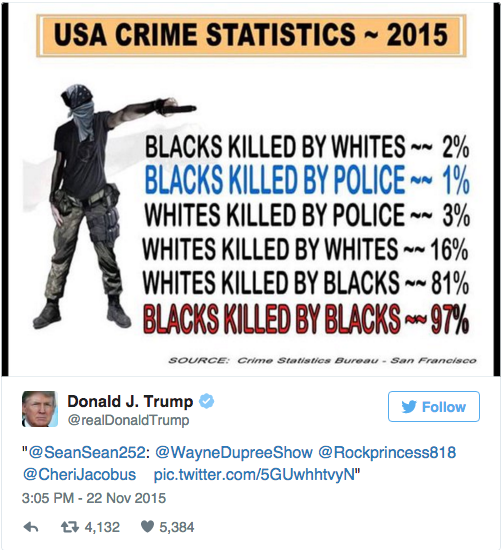
“I don’t know how much more explicit you can get,” said James Edwards, host of The Political Cesspool, a radio program that the Southern Poverty Law Center calls racist and anti-Semitic. “I mean, what other candidate would do that?…We certainly can take a lot of pride in, and what we can certainly invest a lot of hope in, [is] the fact that Donald Trump is saying a lot of these things very similar to the way we present them on the radio, and he is leading the field big-time. That is something that you can absolutely take to the bank.”
Trump’s big social-media boost for the phony black-crime stats was further proof that Trump had “laid out the red carpet for all those who want to move beyond the last 20 years of internet isolation and anonymity,” as Brad Griffin, who blogs on Occidental Dissent, wrote after Trump announced his immigration plan. “All those people, long laughed at and excluded from the ‘mainstream,’ who were cast out beyond the wall of ‘respectability,’ are now in the tank for Donald Trump.”
At various turns in the campaign, Trump has faced questions from the media about his seeming dalliance with the far right, from his selection of a white nationalist party leader as a Republican National Convention delegate, to his retweet of the handle @whitegenocideTM (which was later suspended by Twitter). After the press discovered in January that white nationalists were running robocalls on Trump’s behalf, Richard Spencer worried openly on his?blog that Trump might be forced “to distance himself from the American Freedom Party and American Renaissance, which wouldn’t be good.”
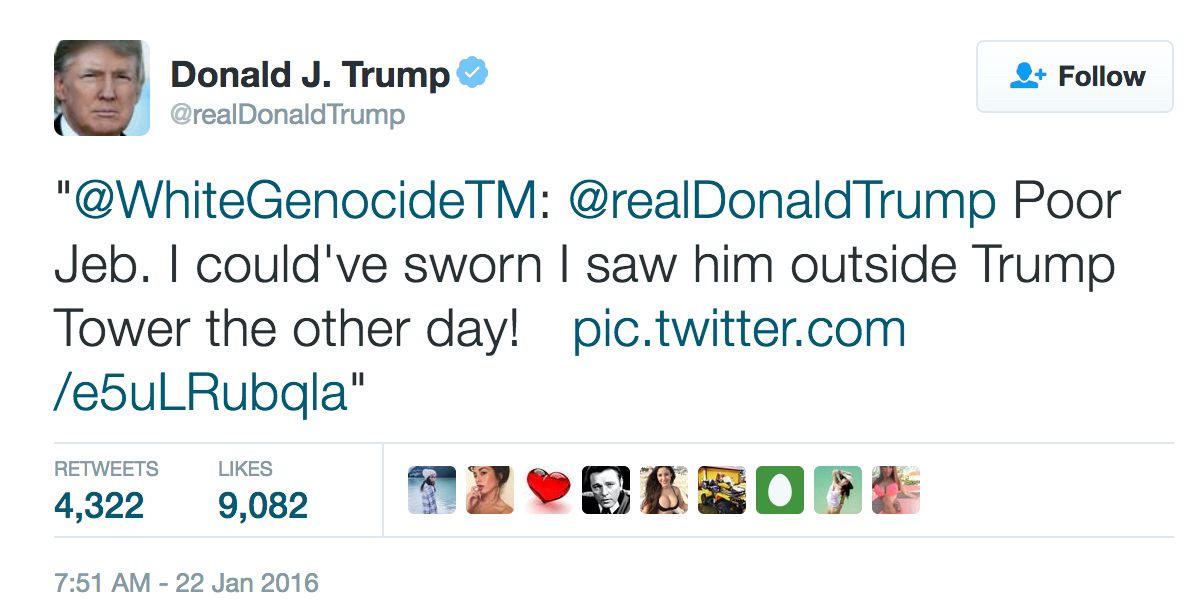
But Trump didn’t back down—greatly impressing the men who had voiced the calls, Jared Taylor and American Freedom Party leader William Johnson. Interviewed on Political Cesspool, Taylor said, “For days everybody was calling him up, calling up his campaign, saying, ‘What do you think of these horrible people? Denounce them, denounce them.’ And he didn’t. He maintained a dignified silence.”
Moreover, Trump openly sympathized with these white nationalist leaders. CNN’s Erin Burnett eventually got Trump to “disavow” the robocalls, but he also explained why the calls didn’t surprise him: “People are angry, they’re angry at what’s going on. They’re angry at the border, they’re angry at the crime.”
“If he disavowed us, he did it, I thought, in the nicest possible way,” beamed Taylor. Johnson called Trump’s response “wonderful…I couldn’t ask for a better approach.” (Johnson, who stepped down as a Trump delegate this spring after Mother Jones reported on his AFP role, reemerged in early October with news that he is now bankrolling campaign ads for Trump in seven states.)
Just a few weeks later, Trump retweeted a riff disparaging Jeb Bush that had been posted by @WhiteGenocideTM, whose user had previously tweeted out his or her admiration for Hitler. The account @TheNordicNation?crowed, “You can say #WhiteGenocide?now, Trump has brought it into the mainstream.”
“Wow. Just wow,” Spencer tweeted.
“Our Glorious Leader and ULTIMATE SAVIOR has gone full-wink-wink-wink to his most aggressive supporters,” Anglin wrote on the Daily Stormer. “Whereas the odd White genocide tweet could be a random occurrence, it isn’t statistically possible that two of them back to back could be a random occurrence. It could only be deliberate.”
Edwards, the Political Cesspool host, said Trump “knew the media would blast him for this retweet, which would only solidify his growing base of support even more.”
Trump’s embrace of the far right soon moved beyond the internet. In late February, the Trump campaign granted Edwards media credentials to broadcast from a Trump campaign rally in Tennessee; and days later, Edwards interviewed Donald Trump Jr. on a white nationalist radio show, the Liberty RoundTable. Despite controversy over the interview, Edwards then received credentials for the Republican National Convention in Cleveland, where he interviewed members of Congress and a Trump surrogate for his show. (How Edwards got into the RNC remains a mystery: The Radio-Television Correspondents’ Gallery of the US House of Representatives, which handles the bulk of media credentials for the conventions, said it did not provide them to Edwards. The Trump campaign also denied involvement, and the Republican National Committee did not respond to requests for comment.)
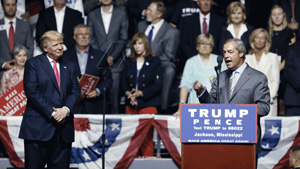
This courtship burst more fully into view in February, when David Duke told his radio audience that voting against Trump was “really treason to your heritage. “When asked about it by CNN’s Jake Tapper, Trump tap-danced around the question, saying he didn’t know enough about Duke or the Klan to disavow them. The alt-right viewed Trump’s subsequent remarks on MSNBC’s Morning Joe—”David Duke is a bad person who I disavowed on numerous occasions over the years”—not as a sign of retreat, but as one of strength. Griffin described it on Occidental Dissent as a “disavowal,” in scare quotes, and applauded Trump’s “refusal to cuck and?condemn ‘white?supremacists'” more broadly.
The pattern continued throughout the presidential race, from Trump’s disparagement of a Mexican American judge overseeing a lawsuit against Trump University to Trump’s retweet of an anti-Semitic image featuring a Star of David and a pile of cash that white nationalists used to smear Hillary Clinton. During the fallout from the latter, Trump went right along with the far right’s pushback that the star was simply a sheriff’s badge. Trump also refused to condemn the barrage of anti-Semitic attacks on journalist Julia Ioffe after she wrote an unflattering portrait of his wife, Melania Trump.

Donald Trump Jr. has also participated in this dynamic, including with his recent tweet of a meme comparing Syrian refugees to a bowl of poisonous Skittles, which delighted extremists. (He eventually deleted the meme.)
Just days before the first presidential debate, Richard Spencer and an alt-right blogger on his radio show mused about whether Trump would ever decisively distance himself from the movement:
Charles Lyons: Donald Trump has not made a concerted effort to denounce us.
Spencer: Yeah.
Lyons: So we need that.
Spencer: Yeah, absolutely, and I don’t think he will at this point.
Lyons: He won’t.
An in-depth analysis we conducted of Twitter activity during a week in September shed further light on social-media connections between far-right extremists and the Trump campaign. In consultation with the Southern Poverty Law Center, we compiled a list of hashtags and catchphrases stemming from extremist movements, terms steeped in Holocaust denial, anti-Muslim invective, and other expressions of bigotry and racism. We used Little Bird software to define networks of users deploying each term, and then to identify thousands of “influencers”—the Twitter accounts most followed within each network. We found that the vast majority of these influencers followed Trump in comparison with other leading presidential candidates, including his closest GOP rival, Ted Cruz. (In general, negligible percentages followed Hillary Clinton and Bernie Sanders.) For example, among the influencers using the hashtag #BanIslam, 84 percent followed Trump and 23 percent followed Cruz. Among those using #WhiteGenocide, 65 percent followed Trump and 10 percent followed Cruz. And among those using the neo-Nazi term “holohoax,” 44 percent followed Trump and 4 percent followed Cruz.
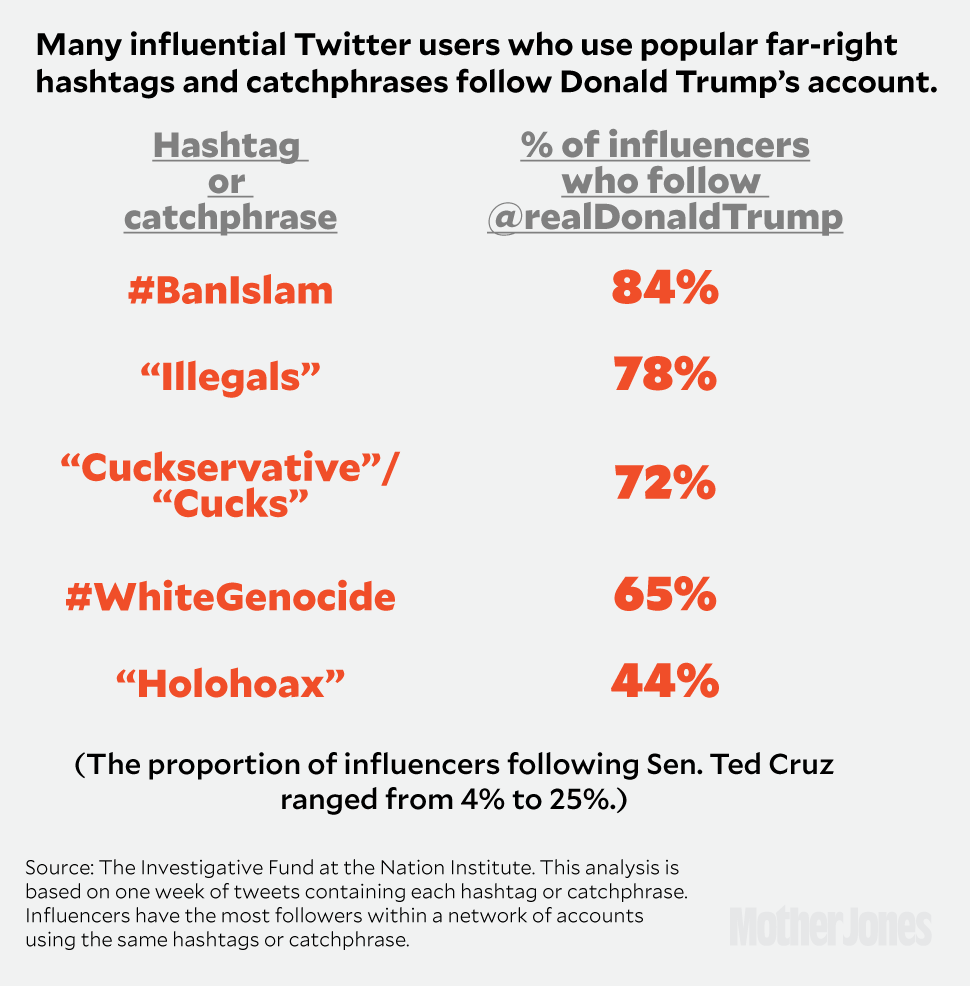
Trump only follows 41 accounts on Twitter, none among the extremist influencers. But it’s a different story with people involved in his campaign: Our analysis of the accounts of more than 200 Trump campaign staffers and surrogates revealed that more than two dozen of them were following five or more of the top extremist influencers.
Following an account on Twitter indicates nothing per se; some users automatically follow anyone back who begins following them. But these Trump staffers and surrogates have been on the receiving end of a stream of inflammatory and hate-filled messages from the influencers they’ve followed, and in some cases retweeted.
Nancy Mace, Trump’s coalitions director for South Carolina, followed 67 extremist influencers in September, including @Rebel_Bill, who regularly posts virulently anti-Semitic riffs and tweeted an image of a transgender woman using a women’s bathroom with the words: “Prosecute or lynch.” Mace told us by email that who she follows is not an indicator of her awareness level, nor any endorsement. “Folks regularly get followed back for the sheer fact they followed me,” she said, pointing out that she followed more than 12,000 people. “I don’t pay much attention to it as it’s time consuming and a lot of it today is automated.” She said she’d never seen the @Rebel_Bill tweets. After we interviewed Mace, the number of people she followed on her Twitter account dropped to just 37. She told us by email in early October that she was no longer Trump’s coalitions director in South Carolina, though she did not respond to further questions about when and why she left that position.
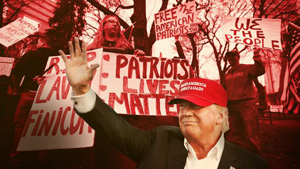
Trump’s South Carolina field director Gerri McDaniel and New Hampshire operative Cynthia Howard each followed @Suthen_boy, who goes by the name Gen. Robert E. Lee and has tweeted about “Black Savages” and declared that “Germans better get over Holocaust guilt or they’ll wind up like the Jews only at the hands of muslim vermin.” Howard has retweeted this account at least once, according to our research—a tweet about the “vile lying Clintons.” Tana Goertz, a Trump senior adviser and his former Iowa co-chair, has on multiple occasions retweeted @Kotcha301, who calls Islam a “child rapist religion.” Both Mace and Seth Weathers, Trump’s former Georgia state director, have each frequently retweeted @cernovich, an avid peddler of conspiracy theories, including with regard to “horny” immigrants and “Sharia rape culture.”
Geoff Diehl, Trump’s Massachusetts field director, followed @LiberalMediaSux, who has tweeted that Islam “condones beastiality and pedophilia” and refers to Muslims as “goat humpers.” Trump spokeswoman Katrina Pierson followed accounts that have declared that “multiculturalism” promotes a program of “genocide against Whites” and that Clinton is “looking to turn your suburb into an ATM for minorities and a Section 8 cesspool.” And Trump surrogate Scott Brown, the former Massachusetts senator, follows accounts that rant about the “Jew media” and call Islam a “rapist religion.”
Apart from Mace, none of the other seven Trump staffers and surrogates we contacted above responded to requests for comment about their social-media accounts and activity.
After we began reaching out to Trump campaign officials for comment in late September, Trump’s call to end birthright citizenship was deleted from the version of his immigration plan posted on his campaign website. Meanwhile, @Ricky_Vaughn99, a vocal Trump supporter—and the top influencer, according to our analysis, among users of the #whitegenocide hashtag—was suspended by Twitter. But before his suspension, he was followed by three Trump staffers and surrogates, including CNN regular Jeffrey Lord. “I had no idea who he was,” Lord responded by email. “I follow all kinds of people from the far left to the far right and people in the middle.”
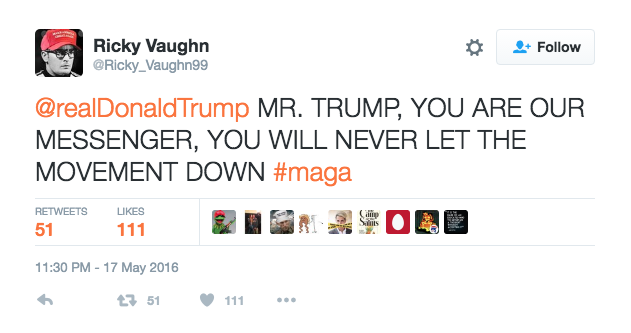
Yet, Trump surrogates have continued to court the extreme right. In early October, Trump’s son Eric and longtime adviser Roger Stone both appeared on the far-right radio program Liberty RoundTable, the one that aired white nationalist James Edwards’ interview with Donald Trump Jr. in March. And on October 12, senior Trump adviser A.J. Delgado retweeted a comment from the notoriously anti-Semitic site The Right Stuff, which gave rise to the triple-parentheses “echo” symbol deployed by the alt-right on social media to target Jewish writers.
The alt-right’s memes and other cultural markers—from the echo (now also used by Jews and others pushing back on the meme) to the use of “Shitlord” as an honorific to describe alt-right true believers—can be inscrutable to outsiders, and have served as a kind of secret handshake for alt-right cognoscenti. It all stems from one core issue. “Race is at the foundation of everything to the alt-righters,” says Mark Potok, a senior fellow at the Southern Poverty Law Center. “They have this idea that white people and white civilization are under assault by the forces of political correctness.”
Some of the memes hijack popular culture, using Taylor Swift’s image to promote “Aryan” beauty or attacking Star Wars for including a central black character. Others are expressions of a fixation on masculinity, such as “cuck” or “cuckservative,” used to suggest that mainstream conservatives are spineless cuckolds. Others tap into deep veins of American racism, such as the term “dindu nuffin” (caricatured dialect for “I didn’t do nothing,” used to describe African Americans, especially Black Lives Matters protesters). Spencer says these memes have “power” and are “a way of communicating immediately.”
One of the alt-right’s most notable pop-culture appropriations is Pepe the Frog—a cartoon character that has been adopted as the movement’s mascot. In October, Trump retweeted an image of himself as Pepe, and campaign adviser Roger Stone and Donald Trump Jr. posted, via Twitter and Instagram, images of themselves alongside a Trump Pepe in a meme satirizing Clinton’s recent remarks about the “deplorables” among Trump’s followers. (Days later, Pepe was designated a hate symbol by the Anti-Defamation League.)
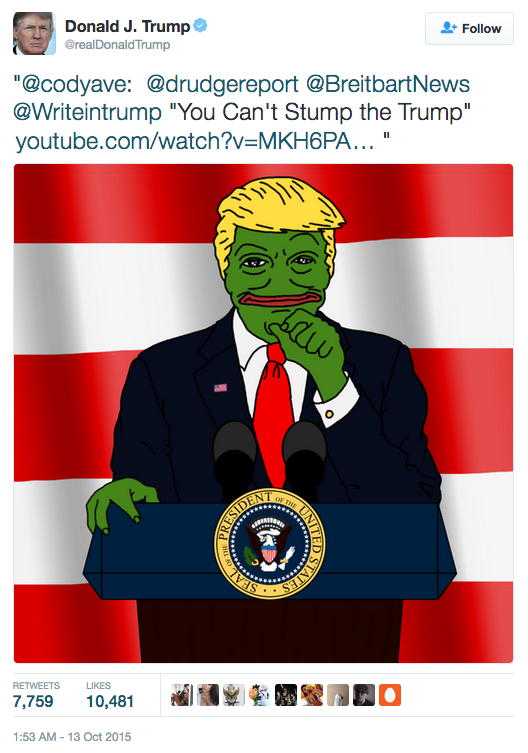
Some alt-right activists and political provocateurs who frequent popular forums such as Reddit and 4chan describe the conversion to their point of view as getting “red pilled,” after the red pill in?The Matrix?that enables?Keanu Reeves to see reality. Alt-righters see it as a metaphor for what they consider to be the revelatory power of their ideology, which cuts through the lies of “social justice warriors,” “Cultural Marxists” and the mainstream media they insist are actively suppressing their views. After Trump Jr. retweeted white nationalist MacDonald, the Occidental Observer editor, Anglin wrote on the Daily Stormer, “Trump Junior: Total Shitlord. News like this really makes you wonder…?Is the Trump family far more red-pilled than they’re letting on?”
For Spencer, Trump is not the logical outcome of a radicalized Republican Party, but an entirely new phenomenon born of the alt-right’s growing prominence—and mainstream conservatism’s collapse. Trump’s “gusto” in expressing “nationalism and togetherness,” Spencer told us, represents a “complete change” in American politics.
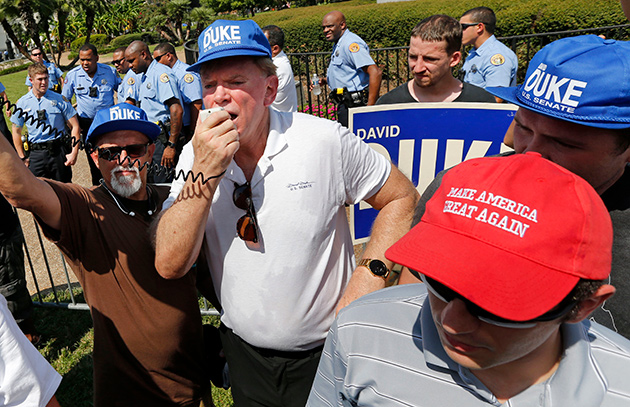
The mainstreaming of alt-right ideology by the Trump campaign has also had an invigorating effect on an older generation of white nationalists. This includes Duke, whose political career was essentially in deep freeze after his 2002 conviction for wire fraud, but who this year is running for US Senate; Taylor, whose career as a “racial academic” dates back to the early 1990s; Brimelow, who became a deeply committed white nationalist in the mid-’90s and now reigns over VDare, a central address of the alt-right; and the Knights Party, the surviving remnant of Duke’s old organization, now being revived by his daughter, Pendergraft, who specializes in white supremacist appeals to women.
Pendergraft, who endorsed Trump last December, said her organization has seen an increase in membership due to Trump. “White people are realizing they are becoming strangers in their own country and they do not have a major political voice speaking for them,” she told us. “Trump is one example of the alternative-right candidate Knights Party members and supporters have been looking for. And we feel that through continued grassroots mobilization, more candidates will arise who will speak out for white Christian America.”
Many white nationalists and their fellow travelers have been saying they are poised to build on Trump’s presidential campaign. Pendergraft and Taylor each told us that win or lose, Trump’s run has brought into view a tremendous dissatisfaction among white Americans. “Those feelings will not go away,” Taylor said. He envisions alt-right candidates for school board, city council, and mayor. “I feel my job will be done when at the PTA meeting a woman gets up and says, ‘Well of course there aren’t as many blacks in the AP courses, because they just do not have the same average IQ,’ and nobody objects.”
Help us continue exposing the rise of the white nationalist movement with a tax-deductible gift to MoJo today.
Anglin predicted that if Trump loses, “it is by fraud, and all of these people who are currently supporting him are going to be radicalized.” Those radicals, he said, will finally realize “there is a Jewish media conspiracy” and “a war on the White man.” Picking up on Trump’s own assertion that a Clinton victory would mean the election is “rigged,” Anglin said Trump would “order a putsch.”
In late August, Occidental Dissent‘s Brad Griffin?mused about the possibility of a Trump win: “Can you imagine?a world in which White Nationalists have come out of the closet, the charge of ‘racism’ elicits only a ‘meh’ and shrugged shoulders, and we have begun to openly organize? Don’t underestimate the power of the presidency to legitimize marginalized people and deviant movements. If Barack Obama can legitimize gay marriage and transsexuals, Donald Trump can legitimize the Alt-Right.”
In the wake of the explosive Trump video, Spencer acknowledged that “it’s going to be difficult for him to win in November.” But as he told us recently, “There have always been people in American history who have had a racialist idea. I just think now it’s like our time has come.”
This article was reported in partnership with The Investigative Fund at The Nation Institute. Additional reporting by Jaime Longoria, Kalen Goodluck, and Evan Malmgren.
